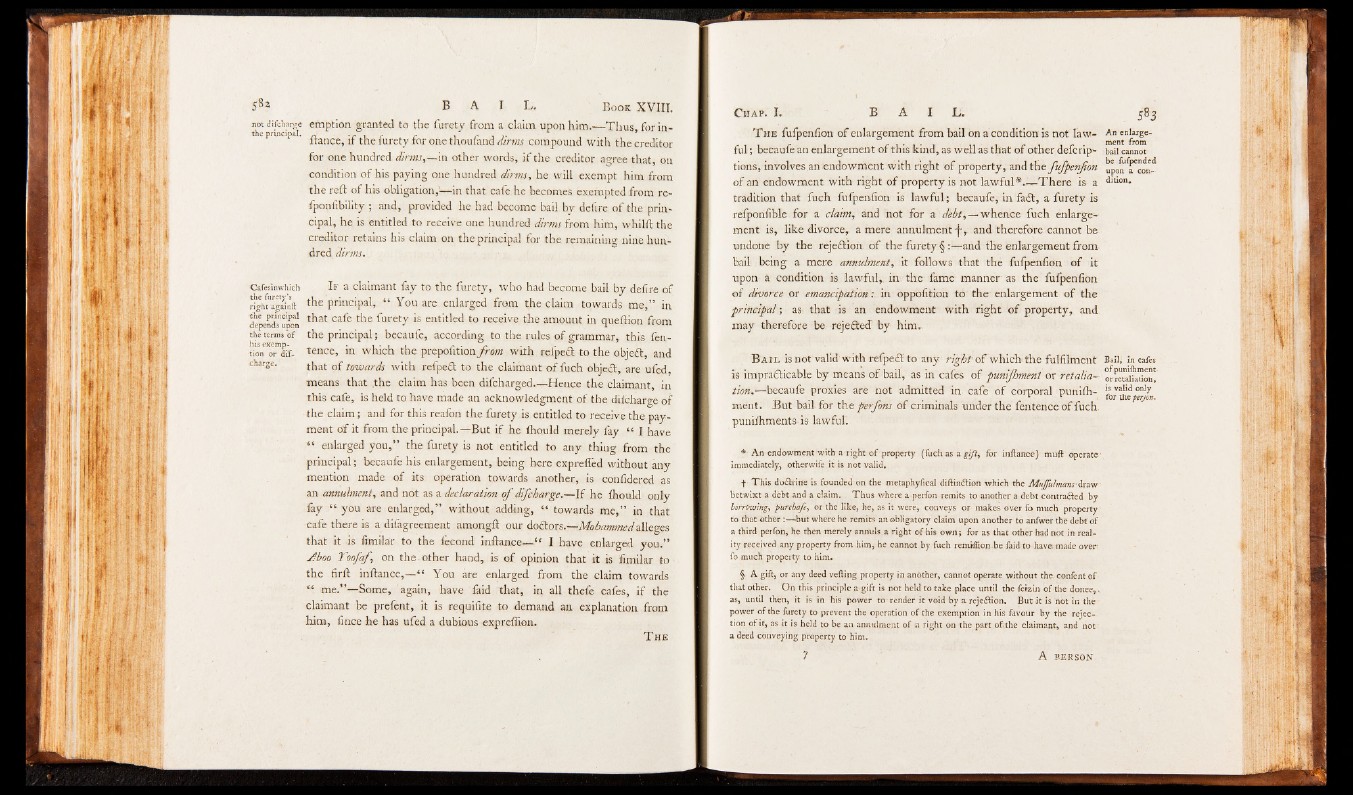
not difcharge
the principal.
Cafesinwhich
the furety’s
right again ft
the principal
depends upon
the terms of
his exemption
or discharge.
emption granted to the furety from a claim upon him.— Thus, for inftance,
if the furety for one thoufand dirms compound with the creditor
for one hundred dirms,—m other words, if the creditor agree that, oil
condition of his paying one hundred dirms, he will exempt him from
the reft of his obligation,'— in that cafe.he becomes exempted from re-
fponlibility ; and, provided he had become bail by defire of the principal,
he is entitled to receive one hundred dirms from him, whilft the
creditor retains his claim on the principal for the remaining nine hundred
dirms. .
I f a- claimant fay to the furety, who had become bail by defire of
the principal, “ You are enlarged from the claim towards me,” in
that cafe the furety is entitled to receive the amount in queftion from
the principal ; becaufe, according to the rules of grammar, this fen-
ten ce, in which the prepofition from with refpedt to the objedt, and
that of towards with refpedt to the claimant of fuch objedt, are ufed,
means that .the claim has been difcharged.—Hence the claimant in
this cafe, is held to have made an acknowledgment of the difchar^e of
the claim ; and for this reafon the furety is entitled to receive the payment
of it from the principal.—But if he fhould merely fay “ I have
“ enlarged you,” the furety is not entitled to any thing from the
principal ; becaufe his enlargement, being here exprefled without any
mention made of its operation towards another, is confidered as
an annulment, and not as a declaration o f difcharge.— I f he fhould only
fay “ you are enlarged,” without adding, “ towards me,” in that
cafe there is a difagreement amongft our ào&ots.—Mohammed alleges
that it is fimilar to the fécond inftance— “ I have enlarged you.”
J!boo Toofaf, on the. other hand, is of opinion that it is fimilar to
the firft inftance,—“ You are enlarged from the claim towards
“ me.” — Some, again, have faid that, in all thefe cafes, if the
claimant be prefent, it is requifite to demand an explanation from
him, fince he has ufed a dubious expreffion.
T h e
T he fufpenfion of enlargement from bail on a condition is not lawful
; becaufe an enlargement of this kind, as well as that of other defcrip-
tions, involves an endowment with right of property, and the fufpenfon
of an endowment with right of property is not lawful*__There is a
tradition that fuch fufpenfion is lawful; becaufe, in fa£t, a furety is
refponfible for a claim, and not for a debt,—.whence fuch enlarge^
ment is, like divorce, a mere annulment")", and therefore cannot be
undone by the rejeftion of the furety § :—and the enlargement from
bail being a mere annulment, it follows that the fufpenfion of it
upon a condition is lawful,, in the fame manner as the fufpenfion
of divorce or emancipation: in oppofition to the enlargement of the
principal-, as that is an endowment with right of property, and
may therefore be rejefted by him.
B ate is not valid with refpedt to any right o f which the fulfilment
is impracticable by means of bail, as in cafes of punijhment or retaliation,—
becaufe proxies are not admitted in cafe of corporal punifh-
ment. But bail for the perfons of criminals under the fentence of fuch
punifhments.is lawful.
* An endowment with a right o f property (fuch as a g ift, for inftance) muft operate-
immediately, otherwife it is not valid.
f T h is do&rine is founded on the metaphyfieal diftin&ion which the Mujfulmans &vzw
betwixt a debt and a claim. T h u s where a perfon remits to another a debt contra&ed by
borrowing, pur chafe, o r the like, he, as it were, conveys or makes over fo much property
to that other :— but where he remits an obligatory claim upon another to anfwer the debt o f
a third perfon, he then merely annuls, a right o f his own; for as that other had not in reality
received any property from.him, he cannot by fuch remiffion.be faid to have; made o ver
fo much property to him.
§ A gift, or any deed veiling property in another, cannot operate without the. confent o f
that other. O n this principle a-gift is not held to take place until the feizin o f the donee,,
as, until then, it is in his power to render it void by a rejection. Bu t i t is not in the
power o f the furety to prevent the operation o f the exemption in his favour by the rejection
o f it, as it is held to be an annulment ©f a right on the part ofcthe claimant, and not -
a deed conveying property to him.
An enlargement
from
bail cannot
be fufpended
upon a condition.
Bail,' in cales
o f punilhment-
or retaliation,
is valid only
for the perjotu